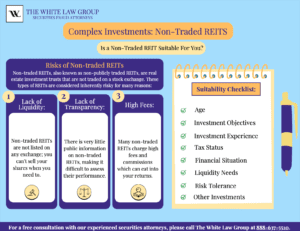SmartStop Self Storage REIT: One for Four Reverse Stock Split
Are you concerned about your investment losses in SmartStop Self Storage REIT, Inc? The securities attorneys at The White Law Group may be able to help you by filing a FINRA lawsuit.
SmartStop Self Storage REIT, Inc.,a non-traded self-storage REIT, launched its IPO on the New York Stock Exchange on April 2nd under the ticker symbol “SMA,” and began trading at a price of $30.00 per share.
The company raised $810 million in its initial public offering, pricing its shares in the bottom half of the REIT’s estimated range of $28.00 to $36.00 per share, or $756 million to $972 million. Shares closed at $33.09, up 10.3%.
The Problem with a Reverse Stock Split
The public offering follows a one-for-four reverse stock split, which adjusted the estimated net asset value (NAV) per share from $14.50 to $58.00 without changing shareholder value. The offering proceeds will be used for debt repayment, preferred stock redemption, acquisitions, and general corporate purposes.
Before the reverse stock split, the SmartStop declared an estimated net asset value per share of $14.50 as of March 12, 2025. Adjusting for the one-for-four reverse split, the post-split estimated NAV per share was approximately $58.00.
SmartStop reinstated its distribution reinvestment plan after suspending redemptions in late 2024 while considering liquidity options. The company had previously attempted an IPO in 2022 under the ticker “SMST”.
SmartStop has joined other recently listed REITs like American Healthcare REIT and Sila Realty Trust. The company owns 218 properties across 23 U.S. states, D.C., and Canada, comprising approximately 156,400 units and 17.6 million rentable square feet.
The White Law Group continues to investigate potential securities claims involving broker dealers who may have improperly recommended SmartStop Self Storage REIT Inc. to investors.
The Risks of Complex Investments: Non-traded REITs
 Compared to traditional investments, such as stocks, bonds and mutual funds, non-traded REITS, like SmartStop Self Storage REIT, are considerably more complex and involve a high degree of risk. Unfortunately, many investors were not made adequately aware of the risks and liquidity problems associated with REITs.
Compared to traditional investments, such as stocks, bonds and mutual funds, non-traded REITS, like SmartStop Self Storage REIT, are considerably more complex and involve a high degree of risk. Unfortunately, many investors were not made adequately aware of the risks and liquidity problems associated with REITs.
First, liquidity risk is a significant concern. Unlike publicly traded REITs, non-traded REITs are not listed on stock exchanges, making it challenging to sell or redeem shares easily. Investors may find themselves locked into their investments for several years, potentially limiting access to their capital when needed.
Secondly, valuation risk is prevalent in non-traded REITs. These investments often lack transparent pricing mechanisms, making it difficult to ascertain the true value of shares. Investors may face uncertainty about the accuracy of reported net asset values (NAVs), which can impact their understanding of the investment’s performance and potential returns.
Moreover, non-traded REITs frequently charge substantial fees and commissions, which can erode returns over time.
Filing a Lawsuit against your Brokerage Firm
Brokerage firms that do not perform adequate due diligence on an investment or demonstrate a breach of fiduciary duty can be held accountable for losses incurred through FINRA arbitration.
FINRA, the regulator who oversees brokers and brokerage firms, provides FINRA Dispute Resolution as an arbitration venue for investors with claims against their brokerage firm or financial professional. It provides investors with an opportunity to attempt to recoup their investment losses and is an alternative to filing such claims in court.
Class Action Lawsuits vs. Individual FINRA Arbitration Lawsuit
People often wonder whether a large class action lawsuit is a better litigation option for them than an individual FINRA arbitration case. The answer depends on many factors, but typically if the loss sustained is large (say larger than $100,000), an individual arbitration claim is likely a better option. Class action lawsuits as a recovery option are more appropriate for grouping large numbers of individuals who have small claims – too small to generally pursue individually.
Free Consultation
If you have suffered investment losses in SmartStop Self Storage REIT Inc. the securities attorneys of The White Law Group may be able to help you. Please call the offices at 888-637-5510 for a free consultation.
The White Law Group, LLC is a national securities fraud, securities arbitration, investor protection, and securities regulation/compliance law firm with offices in Chicago, Illinois and Seattle, Washington.
Tags: non-traded REIT, non-traded REITs, SmartStop Self Storage REIT Last modified: April 3, 2025







